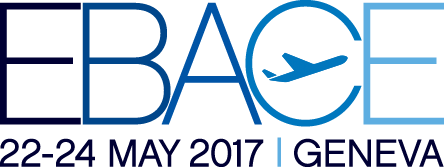EBACE2017 Panelists Debate Industry’s Approach to Brexit
23 May 2017
By Giulia Mauri’s calculation, it takes about six to eight years to negotiate a trade deal. For British negotiators looking to preserve access to the European market after Brexit, “there’s about 18 months,” said the law partner at Pierstone.

Even worse? Negotiating 27 trade deals in 18 months. “Imagine a Europe where we go back to country-by-country, bilateral trade negotiations,” said Mauri. “That’s the worst-case scenario: the UK having to negotiate the nine freedoms of the air, and access to routes, with each country in the EU.”
Mauri and her fellow panelists were discussing Brexit and implications for air transport at the 2017 European Business Aviation Convention & Exhibition (EBACE2017). They agreed the worst-case scenario was extreme, but the best-case scenario also may be unlikely.
“Brexit is clearly happening, and we have to work with that,” said Patrick Margetson-Rushmore, founder and CEO of Luxaviation UK. “As an operator, what we want is the status quo.” That means preserving the European single market in aviation, including fifth freedom rights for UK operators in the EU and the same rights for EU operators in the UK.
“I hate to say it, but the status quo is not an option,” said Gwyneth MacLeod, a former trade negotiator and director of corporate finance and aviation for PwC. Politicians on both sides of the Channel may recognize that aviation is an enabling sector, but that does guarantee they will give it special treatment in their negotiations.
“What’s missing right now is a clear statement of what the industry requires after Brexit,” said MacLeod.
Agreeing on an Approach to Advocacy
That much is true. Given the different political cultures in all 28 EU capitals, as well as the unique politics in Brussels and London, the panelists debated how and when to carry the industry’s message to Brexit negotiators.
“There are different stages to getting your point across,” said Gurpreet Brar, general manager of Edelman UK. “The first is monitoring the conversation. Then there’s intelligence, walking into the major capitals of Europe and getting a sense of what issues can be pushed. If you do those two well, your next job will be easier.”
Now is absolutely the time to monitor and listen. But the timing of when to engage is delicate, because anything that looks like a call for aviation to get special treatment will likely backfire, said MacLeod.
Marc Bailey, the CEO of the British Business and General Aviation Association (BBGA) assured EBACE2017 attendees that the industry was united, and committed to advocating for preserving as much of the status quo – and the single market in aviation – as possible.
In the UK, that means the BBGA is closely aligned with the airlines’ Brexit advocacy, because “the airlines are asking for the same things we are.”
That path may be advantageous in the EU as well. The European Business Aviation Association’s (EBAA’s) senior manager for European affairs, Vanessa Rullier-Francaud, informally polled attendees at the session if they’d rather EBAA align closely with the airlines on Brexit advocacy, or focus alone on the specific needs of business aviation.
Like so much of Brexit negotiations, it’s an open question, but however the industry proceeds, “we will of course be pushing for a level playing field,” said Rullier-Francaud.

